The coffee in Lviv is some of the best that Ryan Coles has ever had.
“Better than Seattle,” declares Coles, an assistant professor of management and entrepreneurship in the UConn School of Business’ Boucher Management & Entrepreneurship Department, who has sampled coffee in cities all over the world as he’s pursued his work as a researcher, educator, sociologist, and entrepreneur.
But when Coles went to Ukraine for the first time earlier this year – crossing the border from Poland and then traveling about 40 miles to the western city of Lviv – it was more than the coffee that defied his expectations.
“I think there is still a stereotype on the American side that you find more cold personalities in Eastern Europe,” he says. “That’s completely wrong. I found people in Ukraine to be very fun, very funny, and very warm. And so, my first impression was: Whoa! Once again, I’m going to a region of the world I’ve never been to, and my priors about the place were inaccurate in major ways.”
What Coles found in Lviv, which is known as one of the main cultural centers of Ukraine, was a city that he says felt a lot like San Francisco, but with 1,000 more years of history – amazing architecture, great food, incredible nightlife, and some exceptional coffee.
“I fell in love really quickly,” he says.
While Coles and his two companions on the trip – Peter Goggins ’21 (CAHNR) ’23 MEGE and Massyl Mallem ’23 (ENG) – were in Lviv, daily life for the city’s inhabitants often times seemed relatively normal. People were shopping, eating at restaurants, and going out at night. Children were also attending school, and couples were getting married.
“On the one hand you’re thinking, this feels so normal,” says Coles. “But then you had moments where you went, oh, wait, this is not a normal period of time. And you would remember that you were in an active war zone, because you’d see sandbags stacked around buildings.”
Or military vehicles and armed soldiers in uniform would make their way down a city street.
Or a siren would go off in the middle of the night announcing a missile launch or a drone attack, and the team would make their way to a basement until given an all-clear.
Or they would have to leave a bar by 11:45 p.m., in order to make sure they didn’t break the city’s midnight curfew.
“You’d be talking to someone, and ask them a simple question like, ‘Where are your mom and dad from?’” says Coles. “And they’d respond, ‘Oh, my dad died last year in the war.’ Immediately you are reminded that there’s something catastrophic happening right now.”
Life hasn’t been normal in Lviv since before February 2022 when Russian military forces invaded Ukraine, marking a severe escalation of conflict that had been ebbing and flowing since 2014.
“In Lviv, you can sometimes forget that there’s a war going on, but never for more than a little while,” says Goggins. “It’s so far from the frontline, but at the same time, there are those very real, gritty reminders.”
For example, Coles, Goggins, and Mallem sipped on coffee one morning in late May in a small café in Lviv with new friends made at Ukrainian Catholic University, connected through a unique initiative called the Ukrainian Global University.
Just a few weeks later in early July, those new friends sent photos of the same coffee shop with its windows blown out by a barrage of Russian missiles that targeted Lviv during the night.
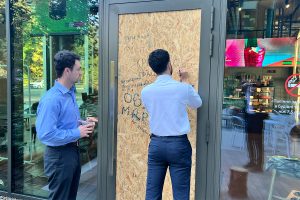
Only days after the missile attack, those destroyed windows were boarded over, and the same coffee shop was once again open for business – a defiant resilience in the face of ongoing and unwanted war.
That resilience is indicative of why Coles, Goggins, and Mallem had traveled to Ukraine in the first place: to help Ukrainian entrepreneurs, facing both the typical and decidedly unique challenges of figuring out how to maintain and even grow a business in a time of extreme uncertainty and while under threat of violence.
Connections
Part of what Arminda Kamphausen does every day as the director of global and sustainability initiatives for the UConn School of Business is make connections.
“I am like the hub, where all the spokes kind of go in and out,” she says, and late last year, a new spoke joined Kamphausen’s ever-growing hub.
“Global Partnerships came to me, along with CISS,” she says, “and they were in discussions with what’s called the Ukrainian Global University, which is a consortium of institutions in Ukraine. And one of the folks who was having these conversations for Ukrainian Global University was Oleksandr.”
Ukrainian Global University was launched by a group of Ukrainian educational institutions and organizations in March 2022, during the first weeks of the Russian invasion, with the goal of identifying talented Ukrainian individuals and providing them with support for projects that will ultimately help the country to rebuild and overcome the impact of war. The initiative has partnered with 20 educational institutions around the globe to date – including UConn – to help support its goals.
Ukrainian Catholic University is a member of the Ukrainian Global University consortium – Oleksandr Akymenko directs the masters’ of science in innovation and entrepreneurship program at Ukrainian Catholic University’s Business School in Lviv.
“We have these 25 bright students who are entrepreneurs,” Akymenko explains, “and we’re helping them to succeed in their business, in their life, by inviting amazing professors to them and running them through all of these topics that really are required to every business to succeed.”
As that hub of all things business and global, Kamphausen follows the work that Coles does as the chief scientist of Daigle Labs, a startup research and development lab born out of a desire to use organization science research to spur tech entrepreneurship in Connecticut and to facilitate environmentally sustainable business growth around the world.
As Coles works overseas in places like South America, Jordan and the Middle East, and Nepal, Kamphausen says she sometimes finds herself living vicariously through him, asking him about his latest trip and hearing stories of his team’s travels, tribulations, research, and accomplishments.
“The energy is high, the enthusiasm is unshakable – you always want to talk to Ryan when you have a new idea, because he gets right into it,” she says. “It’s design thinking in action. Then he is going to take good research out into the world and make it better. But also, in the process of using the research, collect more data to bring back for continuing analysis.”
When Kamphausen spoke with Akymenko about his program, and about the possibility of collaborating with faculty in UConn’s School of Business, she immediately thought of Coles and made the connection.
“She introduced us to Professor Ryan Coles for the first time, and she told me that he has this research interest in entrepreneurship in countries with very harsh environments, during or after periods of conflict, in times of terrorism,” Akymenko says. “And we have this masters’ program in which we are looking for professors all the time, called innovation and entrepreneurship, which I lead. I invited him to run a class with my students.”
“Oleksandr and I met, and right away I said, ‘I’m there,’” says Coles. “Oleksandr mentioned that he’s trying to get faculty from different universities in the U.S. to work with his students, and I said that I’d do it, and also that I wanted to be there in-person.”
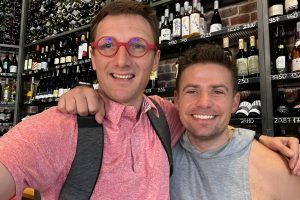
When Coles asked Mallem and Goggins – both recent UConn alumni and young entrepreneurs who are part of his team at Daigle Labs – to join him, they both agreed to the call without hesitation.
“When Ryan told me that he was going to Ukraine, I was like, yes,” says Mallem, who works as a development associate and translator for Daigle Labs. “Ryan, I will follow you to the end of the Earth.”
Collaboration
“People usually say ‘we care about you,’ or ‘we are with you,’” says Akymenko. “But to be with you physically, to arrive to Lviv train station, this means a lot for our students. And Ryan was among the professors who eagerly agreed to come and support us in-person.”
For Coles, it wasn’t a question of if he would make the journey to Lviv, just a question of when. Mallem, Goggins, and Coles were already planning to be in the Middle East in May for fieldwork – so they flew into Krakow, and then made their way to Lviv after they had already been working in Iraq and other Middle Eastern countries.
Coles wasn’t traveling as an official representative of UConn – the trio’s travel wasn’t funded through the University. But as with all of the countries he’s officially and unofficially worked in, Coles brought with him a research-backed program designed to support the environmentally sustainable growth of small- and medium-sized enterprises, particularly those operating in extreme contexts.
“Ninety-five to 99% of businesses around the world fall under this category of small- and medium-sized business,” Coles says. “One of the lab team’s major research accomplishments is that we’ve conducted large-scale randomized experiments with tens of thousands of businesses to test what type of management techniques maximize business revenue and profitability for these small- and medium-sized business while at the same time reducing their carbon footprint per capita.”
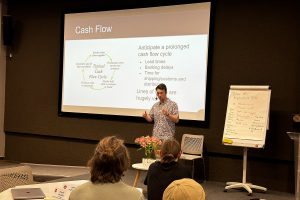
For Coles, bringing Goggins and Mallem with him was essential. Both are recent UConn alumni who launched their own ventures as undergraduates and who immersed themselves in UConn’s entrepreneurial ecosystem – including taking part in the numerous accelerator, training, pitching, and fellowship programs offered through UConn’s Connecticut Center for Entrepreneurship and Innovation, or CCEI and mentoring and venture support opportunities from the Peter J. Werth Institute for Entrepreneurship and Innovation – to support them on their entrepreneurial journey.
“It was important to bring Peter and Massyl with me, because I think students want to also be able to interact with other founders,” Coles says.
“Been there, done that – I can save you from making the mistakes I’ve spent the last couple years of my life doing,” says Goggins, who in addition to running his own venture, works as director of the Startup Foundry in Daigle Labs. “We thought our participation was going to be the most important thing. We have some of startup knowledge and experience that we are happy to bring and disseminate.”
The core of their visit to Ukraine was conducting a three-day workshop with Akymenko’s graduate students at the Business School that focused on startup internationalization and resilience in times of uncertainty.
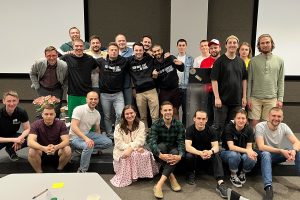
“It used to be –if you go back 10, 13 years – the way you became a multinational company was you started a small business,” says Coles. “You sold in your local market, then you grew your business to sell in a regional market, then you grew to become a national company, and over time, your business matured into a multinational company.
“In today’s more globally connected world, succeeding as a startup often means you need to have multinational operations on day one. And developing international operations as a scrappy startup is a unique entrepreneurial skill developed through global studies and global experiences. Bringing innovative technology to market through entrepreneurship successfully is not just a function of engineering and business expertise, it is also a function of global expertise.”
Coles, Goggins, and Mallem presented a series of workshops to the Ukrainian students, but they also sat down individually with each person, learning about them and their business, offering strategic guidance or advice, and teaching them techniques to identify markets where they might find success.
They also spent time talking about stress, burnout, and the very real toll that starting a business can take on a founder’s mental health in even the best of times, let alone during a war.
“I think the biggest issue they’re facing is with raising capital, raising investment, and finding customers,” says Mallem. “It’s all the same struggles that entrepreneurs face in raising a business – working with people and having to wear like 15 different hats. You don’t have one profession as an entrepreneur. It is fifteen different professions mushed into one. And for them, it’s all the same problems, except the problems are on steroids and human growth hormones, because of the different complications that the war adds.”
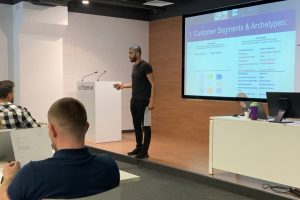
It was a unique, practice-based approach that appealed to both Akymenko and his students, many of whom had never before thought about the possibility of taking their business into markets outside of Ukraine.
The workshop and the personalized approach, though, opened their minds and doors to the possibility thinking about their own entrepreneurship on very different scale.
“I’ve never seen a professor who was so attentive,” Akymenko says. “He was super personal with each of the students. He was eager to know about every single business they do. And I had never seen this before. You know, usually professors go to the crowd of people and teach this class in general terms. But he was eager to know what you are doing and how I can help you.”
Commitment
Every single life in Ukraine has changed since Russia invaded their country, Akymenko says.
“We are a university, and we can feel it,” he says. “Some of our students, some of our employees, professors, went to become soldiers. Some of them were already killed in this war, and this, as you can imagine, influenced us a lot. And we kind of processed this anger and this grief into making an even better institution.”
In addition to conducting the workshop while in Lviv, Coles gave a charitable speech to about 40 in-person participants as well as hundreds of online participants about developing and preserving companies during periods of terrorism and war. The lecture can still be found online, and proceeds from the event went toward a scholarship fund in honor of Oleh Vorobyov, a student at Ukrainian Catholic University killed on the front lines of the war in May 2022.
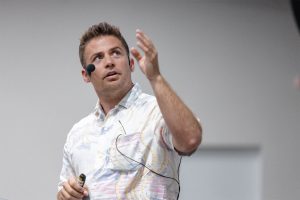
“That scholarship fund supports veterans returning from war, in terms of their education,” says Coles. “When Oleksandr and I talked about the speech, we thought about my unique background and research with businesses operating in violent contexts, and we settled on the idea of ‘organizing for resilience’. Which means, a speech addressing the issue of how do I, as a business owner, reorganize my business so that my employees and I can successfully weather wartime?”
Coles’s on-the-ground experience and research in countries dealing with violence has found that it’s important to focus on short-term operational planning, rather than long-term vision planning, and also to organize a strong hierarchical structure, which offers a sense of security to employees and nimbleness around decision-making in times of instability.
Founders, managers, and their employees also need ongoing support – something Coles and his team are prepared to offer.
“Daigle Labs, and now the entire University, are doubling down heavily on working with Ukrainian companies and helping the Ukrainian people. Forging these close partnerships is key to seeing that through,” says Goggins. “This war is going to end – and it will end in victory for Ukraine, I’m certain of it. But that’s not the end of the road. There’s rebuilding.”
That continued support includes working with individual Ukrainian startups through Daigle Lab’s STEM Startup Foundry as well as establishing an SME development program with business coaching services out of Ukrainian Catholic University.
“We are already putting together proposals, raising funds, collaborating with USAID, reaching out to financial institutions, and coordinating with the business school to get that moving,” says Coles, “because we think it’ll be important in terms of post-war reconstruction efforts.”
In fact, before Coles and his team had even traveled to Ukraine, UConn and Ukrainian Catholic University had entered into a memorandum of understanding (MOU) thanks to the forward-thinking leadership of UConn’s Vice President for Global Affairs Daniel Weiner and the UConn Global Affairs Office.
The MOU that allows for development of research and academic collaboration opportunities in several areas, including with the School of Business’s Entrepreneurship Veterans Boot Camp – a program that might prove particularly relevant in Ukraine’s future post-war reconstruction efforts.
“What we signed in the MOU is pretty broad language to allow for some development in specifics,” explains Kamphausen. “A lot of these MOUs, we say, ‘yes, we’re going to be friends, and we’re going to work together,’ and things work, or things don’t work. But for this particular one, I have a real sense that people are committed, people are invested. Many people at UConn want to demonstrate their support of the Ukrainian people.”
Separately, Dean Emeritus and Professor Timothy Fisher at UConn’s School of Law has been arranging to lecture online about compliance and anti-corruption this fall and to teach a short course remotely in the spring.
The University has also connected with Connecticut’s active Ukrainian American community in order to engage their support and look to them for additional guidance on areas where collaboration takes place.
“I know that our faculty and UConn community is ready and eager to engage in meaningful ways that can help support students, faculty, partner institutions, and reconstruction efforts in Ukraine,” says Weiner. “This partnership is a step toward finding ways to work together to support the Ukrainian people not only during this time of conflict but well beyond.”
Community
Mallem didn’t just stay with Coles and Goggins in Lviv while in Ukraine. He also traveled to Kyiv, Bucha, Irpin, and Hostomel – areas that have been more directly targeted by Russian aggression since the invasion began.
“It’s one thing to see images online and on the news, but it’s a whole other thing to see it for yourself and really understand the extent to which Russians really committed acts of terrorism, not just conventional warfare,” he says. “It’s unjustified, unprovoked war. I think it’s important to talk about the war in that context, using that kind of vocabulary, because it’s not just a conflict between two nations. It’s definitely a nation that’s an aggressor, and unprovoked, unjustified, tried to invade another country.”
While in Kyiv, Mallem visited city landmarks, heard musicians in the street singing Ukrainian nationalist songs, saw hospitals and marketplaces and schools that had been targeted by missile attacks – and learned a lot about the Ukrainian people.
“Every single night, there’s drones, missiles, and bombs being thrown at them,” Mallem says, “and they refuse to stop their way of living, and refuse to stop enjoying each other’s company, and they enjoy celebrating their Ukrainian identity, which was really powerful for me.”
Powerful, too, is the resolve of Ukrainian entrepreneurs.
During a one-day visit to UConn in July, Akymenko donned a shirt that read, “Strong like Ukrainian Business.” While on campus, he met with Coles and leadership at the School of Business to talk about what future partnerships between the institutions might look like. He wants the world to know that the Ukrainian army is resilient, but so are the country’s businesses.
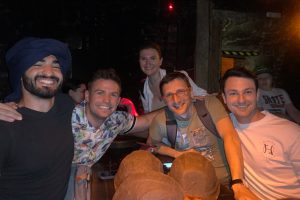
“In newly liberated cities, the business returns within days. The cities recover their shops, their supply chains, and people return to work normally, or at least they try to work normally after these harsh conditions they were in,” he says. “It’s really challenging to become or to be an entrepreneur right now in Ukraine, but I’m really shocked at how people are active in this, how they want to succeed, to survive, and at the very end, have a willingness to donate from their revenue and income to the army’s efforts.”
Coles wants the global community to know about the resolve of Ukrainian businesses as well, but also about what they can offer to markets around the world.
“Their computer science and engineering expertise is off the charts. I think there’s a lot of untapped talent and potential in Ukraine,” he says. “There is a lot of ag-tech talent as well as a lot of AI talent that just needs to learn a bit of management expertise so that these innovators can build businesses around their inventions.”
That’s expertise he hopes UConn can help to offer, and it fits with the mission of Daigle Labs and with his own personal philosophy of hands-on, in-depth, personal coaching, backed by rigorous research and with a commitment to the land-grant mission of the University.
“I’ve always thought that if somebody needed help anywhere, and if it was help I could give, then I’d give it,” says Coles. “I’ve tried to build a team that has that same sense of duty. As a social scientist, my job is to grapple with humanity’s biggest problems. Part of that grapple is actually developing creative solutions to those problems. Once you feel like you’ve got a solution that’s sufficiently proven through science, your next job as a professor is to get the solution to the people who need it.
“It doesn’t matter where it is. When there’s a call to serve, when duty beckons, you answer.”


